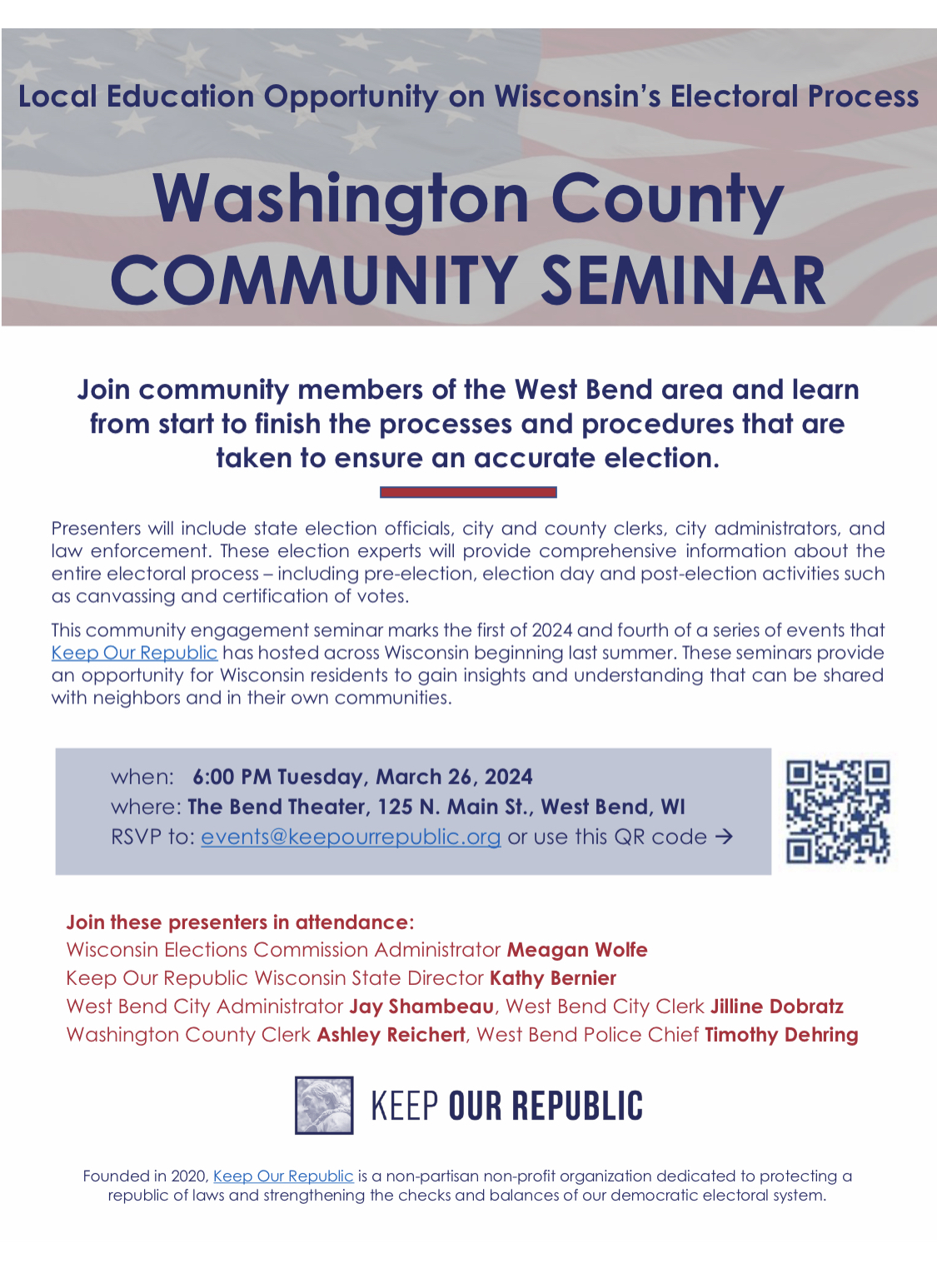Washington Co., WI – Keeping Our Republic – Reflections on a recent Election Integrity Community Conversation

“I recognize that a lot of conservatives want to get some things off their chests, and I appreciate that. We are in 2024. All of the things that you brought up, were challenged through courts; through systems…but we’re not in 2020 anymore…”
The response to a question about election integrity was met by audible groans from the audience. This small exchange encapsulated the energy from last week’s event at The Bend theater, in West Bend.
Walking away from the presentation, it was clear (to me at least) that while we were four years away from the “most secure election in history,” the passion, suspicions, and concerns about the integrity of our election processes are still very real in the minds of people, and evidently for good reason.
The “Trust in Our Elections: A Community Engagement Program” was presented by the national non-profit, non-partisan organization, “Keep Our Republic.” Kathy Bernier, a former Wisconsin state legislator, leads the Wisconsin Chapter of the organization and moderated the program held at The Bend Theater, in West Bend, WI. Per its website, the mission of the organization is “focus on the unconventional threats facing our election system, and on ways to help strengthen trust in our electoral system.”
I had never heard of this organization until a week ago, when I got an email from a local conservative ‘watchdog’ who alerted me to the event. Being a topic of interest of mine, I immediately RSVP’d to attend.
The program kicked off with the mayor of West Bend giving a welcome and introduction to the presenters. On stage were Meagan Wolfe, Administrator for the Wisconsin Elections Commission, City of West Bend Administrator, Jay Shambeau (who was standing in for the recently hired City Clerk, Jillene Dobratz), Washington County Clerk Ashley Reichert, and West Bend Chief of Police Timothy Dehring.
Bernier kicked off the presentation, divided into three sections: Pre-Election, Election Day, and Post-Election. The intention was to have the presenters speak to their office’s respective roles and responsibilities for each section. After the Pre-Election portion had concluded, Bernier invited audience members to line up in one of the aisles to ask questions. This is where things went sideways.
The first question came from a casually dressed middle-aged man, who politely explained he had read that in the last five years, the State of Wisconsin has issued driver licenses to over 250,000 non-US Citizens in the state and there may not be a cross-reference to the current voter rolls. He went on to say that there is an investigation that was recently identified wherein, non-governmental organizations are partnering with government agencies to bring illegal immigrants into the state and open homeless shelters and use them to mass-register for absentee ballots in the state. He mentioned he recently attended an election poll-workers training session where he asked how they were supposed to identify citizenship, and was told that as poll workers, they could not check for that. He summarized by voicing his concern about the huge potential perceived risk of having mass absentee ballot harvesting operations taking place at these homeless shelters and asked the presenters for assurances.
Bernier began to respond with “There’s a lot to unpack there…” but quickly moved to talking about the legality of the voter registration form and explained that anyone could challenge a voter’s registration.
She eventually turned the question over to Meagan Wolfe. “In terms of being able to validate somebody’s citizenship, you’re right. Wisconsin state law does not have a database check on citizenship,” Wolfe explained, “…it is a certification that the voter makes on their voter registration. They have to certify under penalty of law, that they’re eligible, that they’re a citizen.”
She went on to talk about the multiple bills that have been put forward by the legislature, but so far none have passed beyond Governor Evers, who has vetoed them all.
“Until the law changes, there isn’t the ability for a local official to deny an application on additional criteria, so would really require a change in the law to correct.” At this, point there was an audible level of noise among the audience, as a hundred individual conversations were being had over what they had just heard.
The questions kept coming, but it was clear to me by this time, that if I learned nothing else from my experience there, it was this; our state elections seem to have some gaping loopholes that could be exploited by bad actors to enable invalid ballots to slip through the cracks. The real area of weakness seems to focus on the registration process itself.
Generally, outside of Election Day, processing registrations and maintaining voter rolls is a responsibility held by the city, town or village municipal clerk. On the positive side, this is a good thing, since the amount of damage a single city clerk could do (whether through apathy, incompetence, or malevolence) is relatively small. That said, the process for registering to vote seems to have some potential areas of risk. I learned through my training as an election poll worker, that the criterion for registering is simply to show a valid photo ID of some sort (typically a valid state driver’s license or state ID will do), and proof of residence (at least 28 days in the voting precinct).
As Meagan Wolfe explained, a person signing the registration form, must attest (under penalty of law) that they are a US Citizen and of legal age to be eligible to vote. However, since the law allows the DMV to issue valid licenses and/or state ids to non-citizens, this opens up a potential for risk.
In theory, a person could always falsely affirm they are a citizen when they are not, and it would be up to either a city clerk, or other election official to “catch” that falsification. Well, how in the world would someone be able to do that…really? This is particularly concerning, considering a person could submit their registration online, without ever having to stand in front of the person processing their registration. So in application, a non-citizen, in the country on a work visa, but with a valid state driver’s license and a proof of residence could appear to be a legitimate voter and get registered to vote.
While I’m extremely glad, and grateful to the Keep Our Republic and to the community leaders for putting this event together, I’m not sure their goal to “strengthen trust in our electoral system” was met that night. I walked away with more questions than answers, and a growing disquiet about the revelations and confirmed loopholes from our election officials.
But it wasn’t all bad news. I was encouraged by the sheer volume of attendees to this event; it seemed to me that there was ‘standing room only” through most of the event. Even Chief Dehring commented, “This gathering is what makes West Bend great, these questions are what makes this election process…valuable. The biggest partners we have to keeping our elections safe…is all of you.” And that is an encouraging sign.
As we near the spring election this year, I encourage anyone reading this, to consider signing up to be an election poll worker, or just volunteer to observe (which ANYONE can do). Get to know your public officials, especially the city and county clerk, and don’t be afraid to ask questions (politely of course). Finally, please consider reaching out to your state legislators, and let’s work to find solutions to close these gaps that threaten the free and fair elections for all.
The 29:19 – a series of questions 32:59 the audience reacts…
36:10 – state issuing drivers license – 37:46 – “on those licenses they’re not valid for voting but we don’t do that so I think it’s a legitimate concern since any one of us can walk into a polling place with our driver ID and register to vote that needs a process that is impenetrable…”
41:14 – Meagan Wolfe answers driver’s license issue: by State Statute the poll worker isn’t looking at any other items on that photo ID and that includes the address. Right you don’t have to have a current address on your photo ID to use that for voting purposes and so to add an additional criteria of what should the poll worker look at on a photo ID that would require the legislature to pass a law to add an additional thing that the poll worker should be inspecting on a photo ID
WCI COMMENTING RULES OF ETIQUETTE:
While open and honest debate is encouraged here, Washington County Insider asks that you comply with the following rules for posting. Those who do not comply will have their posts removed which may result in being banned from commenting.
Washington County Insider will not publish comments that:
- Are considered likely to provoke, attack, or offend others. This is known as “trolling.” Trollers know when they are trolling, and so do we. *See definition of “troll” below. If you notice a few consistent blog trolls disappear, you’ll know why.
- Are sexually explicit, abusive, or otherwise objectionable.
- Contains inappropriate or vulgar language that is likely to offend.
- Break the law or condone or encourage unlawful activity. This includes breach of copyright, defamation, and contempt of court.
- Advertise products or services for profit.
- Are seen to impersonate someone else.
- Repeatedly post the same or similar messages (‘spam’)
- Include personal contact details such as telephone numbers and postal or email addresses.
- Include a link or photo that has not been approved by the editor prior to posting.
- Are considered campaigning. See also “trolling” above.
- Are unrelated to the topic.
NOTES:
- Just because your comment doesn’t show up right away doesn’t mean you’re being censored. When you post a comment it must first go through our filtering software. If it fails, your comment goes into a queue for manual approval.
- Just because a comment or advertisement is on the site, doesn’t mean WCI endorses it.
- The above rules are not intended to stop criticism or dissenters, but rather to stop those who are incapable of participating in a civilized manner.
*Trolling: a troll is a person who sows discord on the Internet by starting arguments or upsetting people, by posting inflammatory,[1] extraneous, or off-topic messages in an online community (such as a newsgroup, forum, chat room, or blog) with the intent of provoking readers into an emotional response[2] or of otherwise disrupting normal, on-topic discussion,[3] often for the troll’s amusement. (source: Wikipedia)
All letters must include a US Postal address and direct cell/phone number for record keeping.
All letters to the editor for the April 2, 2024, Spring election must be submitted by the business deadline of March 24, 2024.






Thanks so much for posting this letter about the election discussion. Very serious issues raised that need to be corrected to make our elections safe and legitimate. I heard the next day a similar discussion was held in Manitowoc but they restricted questions from the audience! Kudos to the well-informed citizens of West Bend & Wash. Co. who pressed for the truth!